
Open Cardiovascular Medicine Journal
Scope & Guideline
Exploring New Frontiers in Cardiology
Introduction
Aims and Scopes
- Clinical Cardiovascular Research:
The journal publishes studies that investigate various cardiovascular conditions, their pathophysiology, and clinical outcomes, focusing on real-world implications for patient care. - Innovative Diagnostic and Predictive Techniques:
Research utilizing advanced methodologies, such as data mining and machine learning, to predict cardiovascular events and readmissions, is a core focus area of the journal. - Public Health and Epidemiological Studies:
The journal includes studies on the prevalence and impact of cardiovascular diseases in specific populations, addressing public health concerns and risk factors associated with heart conditions. - Mechanisms and Biomarkers in Cardiovascular Disease:
Investigations into biomarkers and physiological mechanisms associated with cardiovascular diseases, such as troponin levels and diastolic dysfunction, are essential contributions of the journal. - Patient-Centric Approaches and Treatment Outcomes:
The journal emphasizes research that evaluates treatment effectiveness and patient adherence, targeting improvements in clinical practice and patient outcomes.
Trending and Emerging
- Impact of COVID-19 on Cardiovascular Health:
There is a growing emphasis on research investigating the cardiovascular implications of COVID-19, including the effects of infection on heart function and outcomes, highlighting its relevance in today's healthcare landscape. - Data-Driven Approaches in Cardiology:
The increasing use of data mining and machine learning techniques to predict cardiovascular events and optimize patient management underscores a trend towards integrating technology in cardiovascular research. - Focus on Younger Populations and Obesity:
Research exploring the intersection of obesity and cardiovascular conditions in younger populations is emerging, reflecting a growing concern about the long-term effects of lifestyle factors on heart health. - Holistic Approaches to Cardiac Health:
Studies that examine the interplay between psychological, lifestyle, and physiological factors in cardiovascular disease are gaining traction, indicating a shift towards more comprehensive patient care strategies.
Declining or Waning
- Narrative Reviews on Established Conditions:
The frequency of narrative reviews on well-established conditions, such as acute myocardial infarction and hypertension, seems to be decreasing as researchers shift towards more novel or emerging topics. - Case Reports of Rare Conditions:
The publication of case reports on rare cardiovascular conditions, such as specific genetic variants or uncommon syndromes, appears to be waning, possibly due to a preference for broader studies with larger sample sizes. - Traditional Risk Factor Studies:
Research focusing solely on traditional cardiovascular risk factors without exploring new dimensions, such as lifestyle interventions or technological advancements, is less frequently observed in recent issues.
Similar Journals
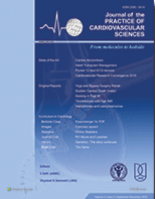
Journal of the Practice of Cardiovascular Sciences
Advancing Cardiovascular Knowledge for a Healthier TomorrowJournal of the Practice of Cardiovascular Sciences, published by Wolters Kluwer Medknow Publications, is an esteemed Open Access journal dedicated to advancing knowledge in the field of cardiovascular health. With its ISSN 2395-5414 and E-ISSN 2454-2830, the journal serves as a vital platform for researchers, healthcare professionals, and students to disseminate and access high-quality studies, innovations, and practical applications related to cardiovascular sciences. Established in 2015 as an Open Access journal, it promotes widespread sharing of insights to enhance cardiovascular practices and address contemporary challenges in the field. As part of a reputable publishing group, the journal is poised for growth and impact, contributing significantly to the ongoing dialogue in cardiovascular research and clinical practice.
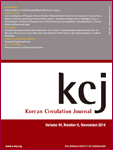
Korean Circulation Journal
Advancing Cardiovascular Knowledge, One Study at a Time.Korean Circulation Journal, published by the Korean Society of Cardiology, has established itself as a prominent platform for disseminating research in the fields of Cardiology and Cardiovascular Medicine. With an ISSN of 1738-5520 and an E-ISSN of 1738-5555, this journal has been at the forefront of cardiovascular science since its inception in 2006 and is projected to continue until 2024. The journal's commitment to quality is reflected in its 2023 category quartiles, ranking in the second quartile (Q2) for both Cardiology and Internal Medicine, as well as its commendable Scopus rankings within the respective fields. Located in South Korea, the journal aims to bridge the gap between cutting-edge research and practical applications, serving as an invaluable resource for researchers, healthcare professionals, and students keen on advancing their understanding of cardiovascular health. Although currently not an open-access journal, it provides a wealth of knowledge that encourages evidence-based practice in clinical settings.

Revista de la Federacion Argentina de Cardiologia
Connecting research and practice in cardiovascular health.Revista de la Federacion Argentina de Cardiologia is a vital publication in the field of Cardiology and Cardiovascular Medicine, providing a platform for researchers and healthcare professionals to share significant findings and innovative concepts since its inception in 2012. Published by the Federacion Argentina Cardiology, this journal specifically addresses contemporary issues and advancements within cardiology, contributing to the scholarly dialogue essential for improving cardiovascular health. Despite being categorized in the Q4 quartile for 2023 and presently ranking #358 out of 387 in its field, the journal remains committed to fostering academic inquiry and disseminating valuable research for both local and global audiences. Although it is not an open-access journal, it strives to balance accessibility with rigorous academic standards, ensuring quality contributions that are critical for practitioners and students alike. The journal’s ongoing evaluation and adaptation in the ever-evolving landscape of cardiology underscore its importance in advancing cardiovascular science and practice.

REVISTA ESPANOLA DE CARDIOLOGIA
Championing Innovation in Cardiac CareREVISTA ESPANOLA DE CARDIOLOGIA is a premier journal dedicated to the dynamic field of cardiology, published by EDICIONES DOYMA S A in Barcelona, Spain. With an impressive Q1 status in the Medicine (miscellaneous) category for 2023, this journal is recognized for its significant contributions to cardiovascular research, evidenced by its rank of #61 out of 387 in the Scopus database, placing it within the top 16% of journals in its field. Covering a broad range of topics within cardiology, the journal aims to disseminate high-quality research, clinical studies, and educational content, fostering knowledge sharing among researchers, clinicians, and students alike. While it does not currently offer open access, the journal maintains a commitment to advancing cardiovascular health through rigorous peer-reviewed articles. With a publication history that spans from 2013 to 2024, REVISTA ESPANOLA DE CARDIOLOGIA is an essential resource for those seeking to stay at the forefront of cardiology advancements and practices.
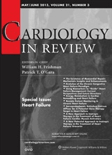
Cardiology in Review
Advancing cardiovascular knowledge for a healthier tomorrow.Cardiology in Review, published by Lippincott Williams & Wilkins, is a prominent journal focused on advancing the field of cardiology and cardiovascular medicine. With a history of publication spanning from 1995 to 2024, the journal serves as an essential resource for researchers, healthcare professionals, and students alike, offering in-depth reviews and analyses on the latest developments, clinical practices, and research findings in cardiology. Despite being a traditional print journal, it maintains a commendable Q2 ranking in both cardiology and miscellaneous medicine categories as of 2023, reflecting its influence and rigor in the academic community, with a Scopus rank of #132 out of 387 in its field, placing it in the 66th percentile. The journal aims to bridge the gap between clinical practice and emerging research, promoting a deeper understanding and integration of innovative strategies in cardiovascular care. With its commitment to high-quality scholarship, Cardiology in Review remains a vital conduit for knowledge and dialogue within the evolving landscape of cardiovascular health.
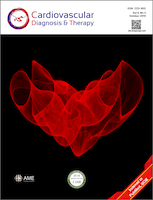
Cardiovascular Diagnosis and Therapy
Elevating Standards in Cardiovascular Medicine and ResearchCardiovascular Diagnosis and Therapy, an esteemed journal in the field of Cardiology and Cardiovascular Medicine, is published by AME PUBLISHING COMPANY, based in Hong Kong, China. With an ISSN of 2223-3652 and an E-ISSN of 2223-3660, this open-access journal aims to present cutting-edge research that significantly advances diagnostic and therapeutic practices in cardiovascular health. Recognized for its impact, it holds a 2023 category quartile ranking of Q2 and is positioned at rank #124 out of 387 in Scopus, reflecting its noteworthy contribution to medical literature with a percentile of 68th. The journal welcomes contributions that span various aspects of cardiovascular research, including clinical trials, epidemiological studies, and innovative therapeutic approaches, making it a vital resource for researchers, practitioners, and students alike, committed to improving cardiovascular care.
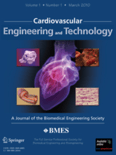
Cardiovascular Engineering and Technology
Driving Innovation in Cardiovascular TechnologiesCardiovascular Engineering and Technology, published by SPRINGER, stands as a prominent journal in the fields of Biomedical Engineering and Cardiology. With an ISSN of 1869-408X, this journal bridges the gap between engineering innovation and cardiovascular health by exploring the latest advancements pertinent to cardiovascular technologies and therapies. The journal, currently in its converged years from 2010 to 2024, holds important positions in Quartile 3 of both Biomedical Engineering and Cardiology and Cardiovascular Medicine categories, highlighting its relevance and influence in these domains. Ranked in the 59th percentile for Cardiology and 42nd percentile for Biomedical Engineering, the journal is a valuable resource for researchers, professionals, and students keen on understanding the intersection of engineering solutions and cardiovascular medicine. Although the journal is not open access, it remains highly regarded for its rigorous peer-reviewed content that contributes to the advancement of technology in the cardiovascular field.
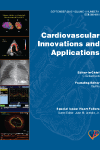
Cardiovascular Innovations and Applications
Exploring cutting-edge research to transform cardiovascular care.Cardiovascular Innovations and Applications is a premier open-access journal dedicated to advancing knowledge in the field of cardiovascular medicine. Published by COMPUSCRIPT since 2016, this journal provides a platform for the dissemination of innovative research and applications that address crucial topics in cardiology, aiming to bridge the gap between clinical practice and cutting-edge research. With an ISSN of 2009-8618 and an E-ISSN of 2009-8782, it operates on a global scale, facilitating access to high-quality content without financial barriers. The journal is positioned within the Medicine - Cardiology and Cardiovascular Medicine category, and its current Scopus rank of #321/387 reflects its potential for growth and influence in the academic community, being in the 17th percentile. Researchers, healthcare professionals, and students will find Cardiovascular Innovations and Applications an invaluable resource in their quest for the latest findings and advancements in cardiovascular health and treatment methodologies.
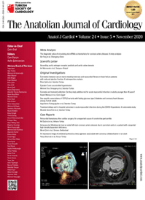
Anatolian Journal of Cardiology
Empowering Cardiovascular Insights, One Article at a Time.The Anatolian Journal of Cardiology, published by KARE PUBL, stands as a vital resource in the field of Cardiology and Cardiovascular Medicine. With an ISSN of 2149-2263 and E-ISSN 2149-2271, this Open Access journal has been fostering the dissemination of critical research since 2001, ensuring that high-quality content is freely available to a global audience. Based in Turkey, the journal aims to bridge gaps in cardiological knowledge through rigorous peer-reviewed articles that span a wide range of topics, from innovative clinical practices to groundbreaking research findings. While its current ranking places it in the Q3 category of cardiology journals, the Anatolian Journal of Cardiology continues to strive towards enhancing its impact, currently holding a Scopus rank of 236 out of 387. Researchers, practitioners, and students alike will find this journal an essential platform for keeping abreast of the latest developments in cardiovascular health.

JAMA Cardiology
Shaping the Future of Cardiology with Rigorous Science.JAMA Cardiology, published by the American Medical Association, is a leading peer-reviewed journal in the field of cardiology and cardiovascular medicine, with an impressive impact factor signifying its influence and relevance within the medical community. Established in 2016, this journal has quickly gained recognition, currently positioned in the Q1 quartile and ranked #2 out of 387 in its field according to Scopus, reflecting its commitment to high-quality research dissemination. As an esteemed publication, JAMA Cardiology aims to advance the understanding of cardiovascular health through rigorous studies, reviews, and clinical insights. The journal is dedicated to serving a diverse audience of researchers, clinicians, and students, ensuring they have access to groundbreaking findings and comprehensive discussions that shape contemporary cardiology. Although it is not an open-access journal, articles published within it play a pivotal role in informing clinical practice and guiding future research in cardiovascular health, making it an essential resource for anyone engaged in this vital field.